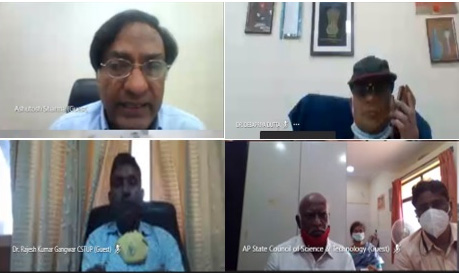 DST Secretary Prof. Ashutosh Sharma highlighted the critical role of state S&T Councils in creating scientific awareness and strengthening state-level S&T infrastructure as well as resolving regional problems, at the 6th Annual Meet of State S&T Councils organised virtually by Karnataka State Council of Science and Technology (KSCST).
DST Secretary Prof. Ashutosh Sharma highlighted the critical role of state S&T Councils in creating scientific awareness and strengthening state-level S&T infrastructure as well as resolving regional problems, at the 6th Annual Meet of State S&T Councils organised virtually by Karnataka State Council of Science and Technology (KSCST). “The importance of S&T Councils lies not only in resolving state-specific but also region-specific problems,” Prof Sharma stressed at the inaugural session of the annual meet organised from 18 June 2020 to 1 July 2020 to promote sharing of best practices and knowledge acquired among the State S&T Councils.
He appreciated the efforts of Punjab State S&T Council in creating a public-private partnership to tackle the challenge of straw burning at village level by establishing a briquette production unit utilizing paddy straw in Moga and Patiala, Punjab. He requested all the State S&T Councils to facilitate establishment of State Spatial Data Infrastructure (SSDI) in the footsteps of Karnataka.
“The State S&T Councils must evolve as catalyst of STI ecosystem as knowledge managers and take up a lead role in assessing and implementing commercially viable solutions for state-specific needs through appropriate delivery mechanism,” Professor Sharma added. He invited all S&T Councils to participate proactively in consultative process of National Science, Technology and Innovation Policy (STIP) 2020 and urged them to develop STI based strategy for economic regrowth during Post-COVID 19 period.
Officials of S& T Councils from 29 States and 2 Union Territories (UTs) participated during the inaugural session.
State Science and Technology Programme initiated in 1974, is a unique Centre-State Science and Technology (S&T) Cooperation mechanism supported by Department of Science and Technology (DST), Government of India. Through this partnership, the State level Science, Technology, and Innovation (STI) ecosystem is catalysed for overall socio-economic development at State and National level.
Over the Years, State S&T Councils have been working extensively towards S&T interventions for state-specific problems, creating scientific temperament and culture of innovation at the grassroots level.
However, in last one year, this support mechanism has focussed on strengthening State STI ecosystem through systemic interventions. Some of the noteworthy interventions are establishment of world-class Institute of Advanced Virology at Thiruvananthapuram with modern infrastructure to carry out cutting edge research in virology, establishment of 29 Intellectual Property Rights (IPR) Cells in Universities and Colleges and one Centre of Excellence (CoE) to boost the culture of innovation in country. A Centre CoE-Cyber Security (CYSECK) has also been established to promote cyber-safe conducive environment for industry collaboration, address skill gaps, and facilitate innovation in this emerging field of Cyber Security in Karnataka.






























